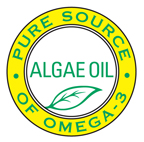 Fishing for Omega-3 supplements from marine algae
Fishing for Omega-3 supplements from marine algaeBy the editors of Environmental Nutrition, Environmental Nutrition Newsletter
Q. Can marine algae omega-3s provide the same benefits as fish oil ?
Premium Health News Service SOURCE: chicagotribune.com, January 30, 2013;
Editorial Commentary By Scott Doughman, PhD
- There are two interesting points right off the bat. First is the consideration of algae as marine. Marine algae is a correct designation in general and with few exceptions.
- Second, the supplement model is the only method of educating about the science of fish oil and algae oil and fish as food, all are separate. Combined algae DHA supplements with food is needed. Combined EPA supplements with food is needed. There is really no difference between the two. I concluded and have published that after 6 months of any EPA or DHA or EPA+DHA combination with any biologic fatty acid therapy that these are identical in relative omega-3 index and omega-3 physiology outcome. The differences are far more meaningless than the similarities. No one formula is superior, although products may compete for best. DHA inherently is EPA and EPA is inherently DHA as needed once in the body. Don't discount you have a healthy powerful liver for metabolism.


